
Anti-Ahmadi hashtags: Initiated by Jamiat Ulema Islam, supported by all
The hashtags #AhmadisAreNotMuslims and #Expose_Qadyani_ProMinisters may have been started by JUI activists, but their popularity amongst users across the political spectrum reflects the strength of anti-Ahmadi hatred in Pakistan.
Anti-Ahmadi hatred in Pakistan now has a new outlet: Twitter. On 10 May 2020, three hashtags targeting the Ahmadiyya community popped up nearly simultaneously, racking up tens of thousands of tweets each to become the most trending topics on Pakistani Twitter.
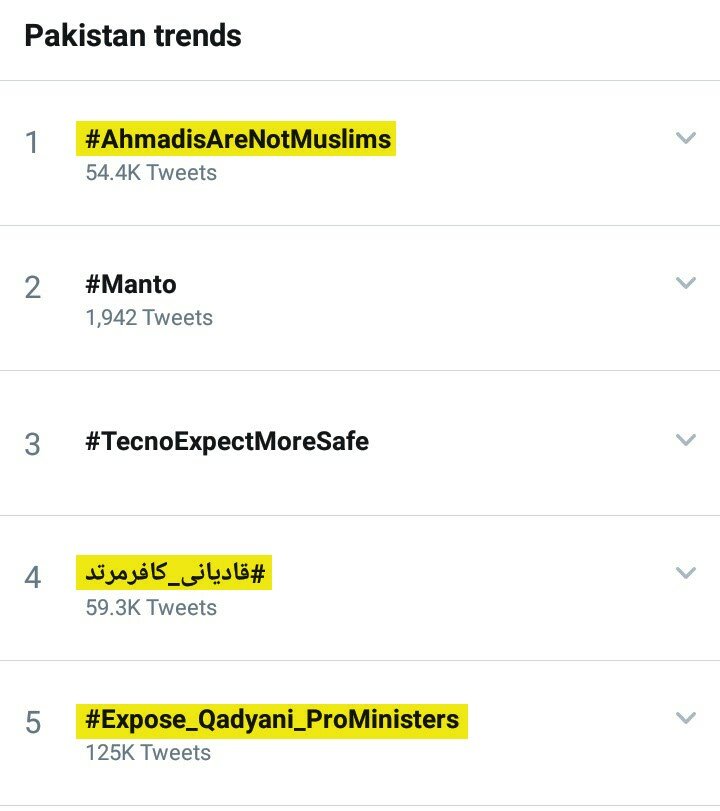
The intended message behind the hashtags was fairly self-explanatory. #AhmadisAreNotMuslims conveyed its message quite unambiguously within the hashtag itself. Another, more ominous, trend was # قادیانی_کافرمرتد (#QadiyanisAreApostates), which employed a derogatory term commonly used to refer to Ahmadis to condemn them as apostates; in other words, permissible to be killed. While such opinions have been espoused on social media before, the trigger for these particular hashtags was reporting that some members of the federal cabinet had pushed for the inclusion of Ahmadis in the National Commission for Minorities, news that was subsequently confirmed in an interview by the Minister for Religious Affairs.
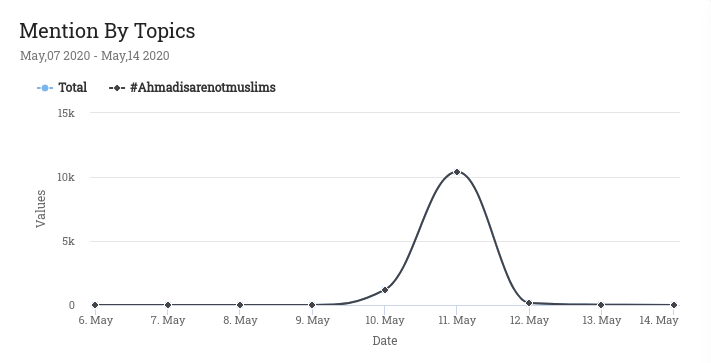

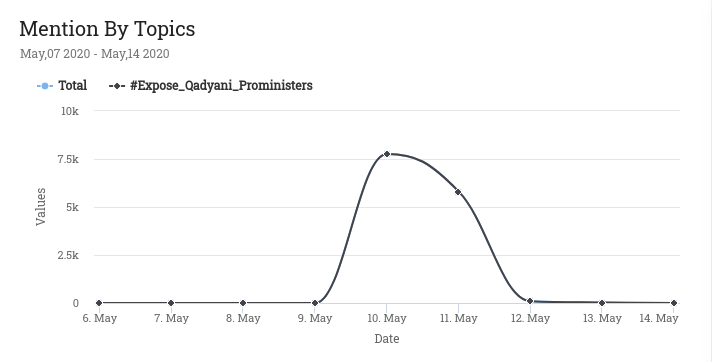
While there was no indication that Ahmadi representatives were even willing to accept a seat on the council, one may have assumed that more conservative elements in the country would have welcomed such a development since it would confirm the legal status of Ahmadis as a “minority” rather than “Muslim”. But to those who are convinced that Ahmadis are engaged in a long-running deep state conspiracy to destroy the nation of Pakistan from within, even this was a step too far, hence the trending of another hashtag #Expose_Qadyani_ProMinisters which demanded the identification and firing of those ministers that had advocated for their inclusion.
So who was behind these hashtags? Their sharp peaks and subsequent disappearance hinted at their manufactured nature. But while there are numerous groups with an extensive track record of artificially promoting trends online, in this instance the hashtags #Expose_Qadyani_ProMinisters and #AhmadisAreNotMuslim were the creation of Twitter accounts associated with Jamiat Ulema Islam – Fazl (JUI-F).
#Expose_Qadyani_ProMinisters
While the JUI-F, may no longer be an electorally relevant force, they’re certainly capable of creating a stir on the streets and online. With controversy arising over the “support” given to Ahmadis by certain federal ministers, they saw a perfect opportunity to target PTI, one of their fiercest electoral foes.

Starting on 16:53 on 10 May, JUI-F workers and supporters launched a flurry of tweets with the hashtag #Expose_Qadyani_ProMinisters. While there was not a single tweet using the hashtag before 16:53, by 17:08, over 400 tweets using the hashtag had been sent out in quick succession — perhaps the clearest indication of the hashtag’s inauthentic nature. Meanwhile the bios of many of the accounts promoting the hashtag revealed their affiliation with JUI-F. The three accounts that tweeted most frequently using the hashtag were also affiliated with JUI-F, and JUI-F affiliated accounts were similarly some of the most retweeted accounts on the hashtag.
#AhmadisAreNotMuslims
It’s a similar story with the hashtag #AhmadisAreNotMuslims, which garnered at least 58,000 tweets, of which 12,000 were original tweets. But while a total 5700 accounts tweeted using the hashtag, a mere 570 of them were responsible for just under half of all the tweets sent out using the hashtag, a curious occurrence that once again hints at coordinated inauthentic behaviour.
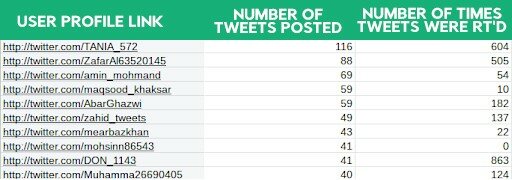
Again, a look through the accounts revealed visible affiliations with JUI-F. The most retweeted account on the hashtag stated JUI-F Sindh in its bio, while three of the five accounts that tweeted most frequently using the hashtag were also affiliated with JUI-F. In fact one of the accounts, Zafar Ali Shah (@ZafarAl63520145), was the same account that sent out the most tweets on the hashtag #Expose_Qadyani_ProMinisters. It wasn’t alone. Nearly a quarter of all the tweets using the hashtag #AhmadisAreNotMuslims also contained the Qadiyani Ministers hashtag, showing a significant overlap in accounts that helped promote them.
However, while JUI-F may have played an instrumental role in boosting these hashtags, it wasn’t the only one. Anti-Ahmadi prejudice cuts across party lines; some of the earliest accounts to use the hashtag #AhmadisAreNotMuslims were TLP supporters, a PML-N worker was one of the most retweeted accounts, while many PTI fans were also prominent in boosting the hashtag. Even social media celebrity Waqar Zaka got in on the act, tweeting twice using the hashtag, and posting a (since deleted) video about it on both Facebook and YouTube that generated many thousands of views and served to boost the hashtags.

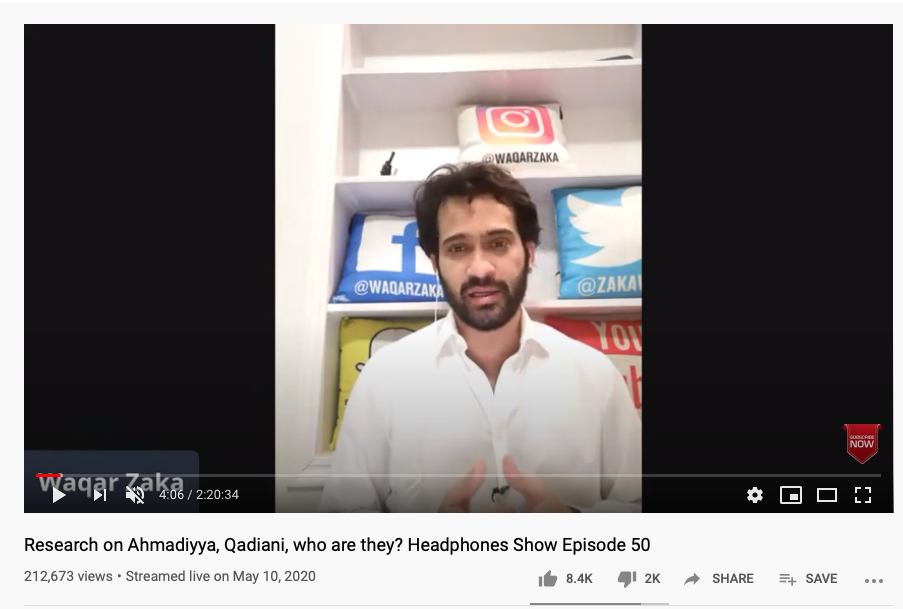
It is this widespread animosity towards Ahmadis in general that arguably allowed these particular hashtags to begin trending in the first place. By contrast, the hashtag #NewPMMaulana that JUI-F tried to trend around the same time, failed miserably, picking up a mere 20 mentions, as there is little popular support for Maulana Fazlur Rehman to become the new Prime Minister.
#قادیانی_کافرمرتد
This hashtag was also started on 10 May, at around 23:00, with tweets sent out throughout the night to ensure it was one of the top trending topics on 11 May. Unlike the other two hashtags, however, this was the creation of a more familiar organisation: Team Pakistan Zindabad. The hypernationalist Team Pakistan Zindabad coordinates a network of pro-PTI and pro-military Twitter accounts that artificially promote trends online, most recently targeting the Minister of Human Rights.
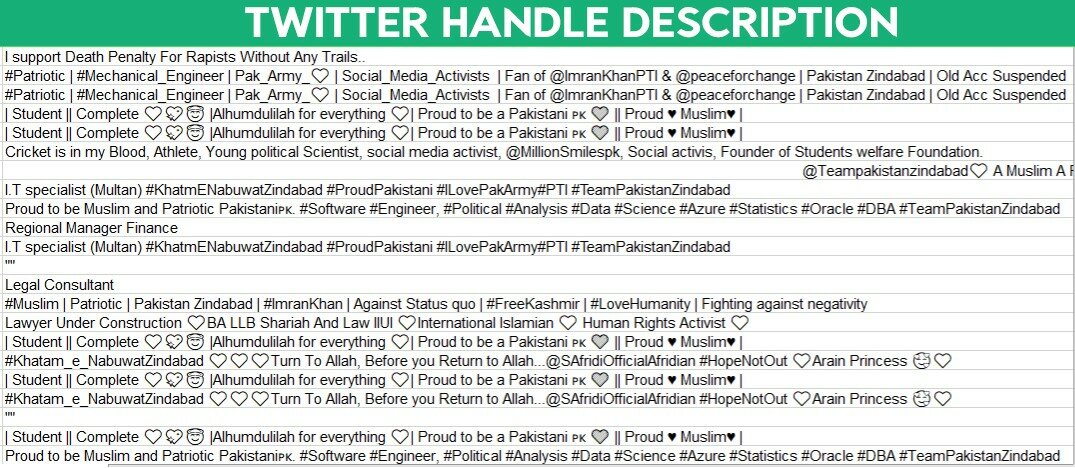
Many of the account bios involved in starting the hashtag openly state their affiliation to Team Pakistan Zindabad, and unsurprisingly some of the most frequently tweeting and retweeted accounts on the hashtag also carry that affiliation. What was interesting however, was to see the crossover between Team Pakistan Zindabad and other similar networks of Twitter accounts.

Similar to the account bios of the earliest tweeters shown above, the bio and header of the third-most active tweeter on this hashtag also display pro-Army and pro-PTI sentiment, but curiously along with #TeamPakistanZindabad, it also states “Admin #TeamIK_Warriors”, referencing the pro-PTI Twitter network that is infamous for promoting the hashtag #ArrestAntiPakJournalists last year.
#TeamIK_Warriors wasn’t the only Twitter account network involved in this hashtag. Another top tweeter on the hashtag belonged to a similar nexus of pro-PTI and pro-military accounts named Team Patriots Official. And another of the earliest tweeters on the hashtag was the admin of yet another pro-PTI network called Team Mastanda, which is currently suspended on Twitter.


The possibility of coordination between these Twitter networks is an interesting one, and something deserving of greater research. Despite Twitter’s rules prohibiting any “coordinated activity that attempts to artificially influence conversations through the use of multiple accounts, fake accounts, automation and/or scripting”, its loose enforcement means that Pakistani Twitter trends are an easy target for such coordinated inauthentic behaviour. Multiple political parties and hashtag mills have already demonstrated this, JUI is simply the latest to do so.



